![]()
Main Menu · Search · Current Issue · Contact · Archives · Centennial · Letters to the Editor · FAQs
![]()
Main Menu · Search · Current Issue · Contact · Archives · Centennial · Letters to the Editor · FAQs
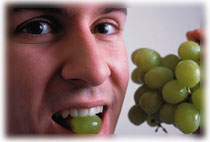 Activist Kovacevich partakes. Photograph by Flint Born Activist Kovacevich partakes. Photograph by Flint Born |
Not-So-Sour Grapes
What issue was most on undergraduates' minds during the first half of the academic year? No, not that one. Rather, it was the fierce debate over whether to maintain Harvard Dining Services' five-year-old ban on serving grapes--an offshoot of a United Farm Workers (UFW) boycott launched in 1984. A raging campaign of posters, rallies, e-mail messages, and articles in the Crimson ended in a December 3 electronic referendum won by the pro-grape side, 1,694 to 1,472. Adam Kovacevich '99, whose family's company grows grapes in Bakersfield, California, organized the victorious Grape Coalition. While he arranged for 300 pounds of the forbidden fruit to be shipped in for sampling, the UFW's recent focus on strawberries rather than grapes may have undercut the force of its ban. In a pun-filled Wall Street Journal article on the contretemps ("The Grape-Deprived Who Dine at Harvard Press Their Case"), Kovacevich explained, "I love to eat grapes." That sentiment appears to have squeezed out the competition.
Signal Appointment
Lani Guinier '71, a specialist on legal issues involving race and gender, including voting rights, will join the Harvard Law School faculty this fall, becoming its first tenured black woman. She has taught at the University of Pennsylvania Law School since 1988. Dean Robert Clark, whose faculty has been sharply divided about diversity in the past, said he hoped Guinier's appointment would "help the school attract other top scholars of diverse backgrounds, including more women of color." Guinier was a visiting professor at the law school in the 1996 winter term. Her father, Ewart Guinier '33, served as the first chairman of Harvard's Afro-American studies department.
But Do They Call It "Haavad"?
With President Neil L. Rudenstine broaching the idea of new Harvard research outposts overseas ("Home Stretch," January-February, page 68), one prototype has already taken shape. The Business School's California Research Center set up shop last summer in Menlo Park, the epicenter of Silicon Valley's venture-capital community. Citing the importance of entrepreneurship, Dean Kim Clark said at an inaugural lunch last autumn, "I told my colleagues that we needed to be out [here]." The center supports work on case studies used in the school's curriculum, and other research.
Leaving Leverett
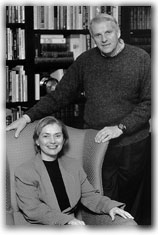 The Dowlings. WILLIAM B. DECHERD/HARVARD CRIMSON The Dowlings. WILLIAM B. DECHERD/HARVARD CRIMSON |
Lowell House is looking for new co-masters (see "Brevia," January-February, page 75), and now John E. Dowling '57, Ph.D. '61, and Judy Dowling, A.M. '89, have announced their decision to step down from the Leverett House mastership, ending 17 years of service. John Dowling, Cabot professor of the natural sciences, told the Crimson the timing was determined by their daughter's pending graduation from high school; she has lived in Leverett House since she was a year old. The Dowlings' tenure was marked in particular by careful selection of resident tutors--students were involved in the process--and by their yearly trip for sophomores to Woods Hole Oceanographic Institute, where Professor Dowling, a neuroscientist, conducts research each summer.
The Research Professorate
The Faculty of Arts and Sciences (FAS) has authorized a discretionary new title, "research professor," for use by emeriti during the first five years of their formal retirement. FAS dean Jeremy R. Knowles explained at a faculty meeting that, faced by law with the end of mandatory retirement in 1993, FAS adopted measures--granting office space, allowing occasional teaching--that would, voluntarily, make retiring "less of a sharp separation" for professors, even as they were "liberated from their duties." The new title has been designed to make it easier for retired faculty members who are engaged in research, particularly in the sciences, to apply for grants. After a certain amount of comment from humanists who said "scholarship" better described their studies, the official proposal carried the day.
The Soft Life
Life really was harsher in the old days. The Crimson reported on January 9 that Harvard College, in response to student demands, has replaced one-ply toilet paper in undergraduate residences with the two-ply species. Dean Harry R. Lewis explained that a "high-level committee, called the Harvard College Toilet Paper Commission, consisting of the Administrative Board, the Faculty Council, the Committee on House Life, the Committee on College Life, and the Masters of the Houses...met weekly all fall to consider this important issue." Their advice, Lewis said, prompted his decision. No word yet on University policy toward graduate students, faculty members, or staff.
125 Years of Ph.D.s
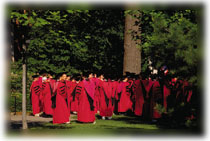 A flock of Ph.D. candidates. CHRISTOPHER S. JOHNSON A flock of Ph.D. candidates. CHRISTOPHER S. JOHNSON |
Nota Bene
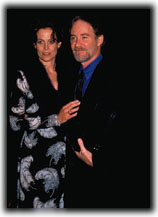 Persons of the year. STEVE SANDS/OUTLINE Persons of the year. STEVE SANDS/OUTLINE |
Appointed. Harry Cooper '82, Ph.D. '97, was named the first associate curator of modern art at the Fogg Art Museum, inaugurating a department of modern and contemporary art. The search has begun for a curator for the museum's contemporary art works.
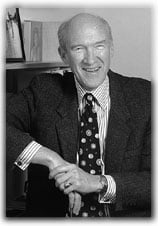 Simpson. MARTHA STEWART Simpson. MARTHA STEWART |
Class chemists. The seventy-fifth anniversary issue of Chemical & Engineering News selected 75 top chemists of the past 75 years--at least 18 of whom were Harvard-educated or served on the faculty. Among those named were Elias James Corey, Emery professor of organic chemistry; Dudley R. Herschbach, Ph.D. '58, Baird professor of science; and Frank H. Westheimer, Ph.D. '35, Loeb professor of chemistry emeritus.
Hail, historians. The American Historical Association has named three senior historians scholars "of the highest distinction." Two of the three honorees are from Harvard: Alfred D. Chandler Jr. '40, Ph.D. '50, LL.D. '95, Straus professor of business history emeritus, and Benjamin I. Schwartz '38, Ph.D. '50, Williams professor of history and political science emeritus.
Honored authors. Nominees for the National Book Critics Circle awards include two books by Harvard faculty members, published by Harvard University Press. They are The Art of Shakespeare's Sonnets, by Helen Vendler, Ph.D. '60, Porter University Professor, and The Bible As It Was, by James L. Kugel, JF '75, G '77, Starr professor of Hebrew literature. Alumni nominees include Pauline Maier '60, Ph.D. '68, for American Scripture, Steven A. Pinker, Ph.D. '79, for How the Mind Works; and Anne Fadiman '74, for The Spirit Catches You and You Fall Down. Winners will be announced March 24.
Main Menu · Search · Current Issue · Contact · Archives · Centennial · Letters to the Editor · FAQs
![]()